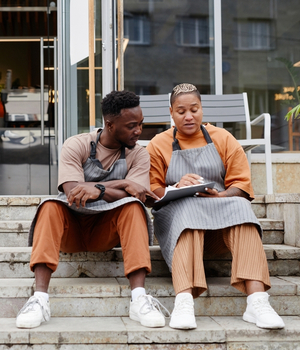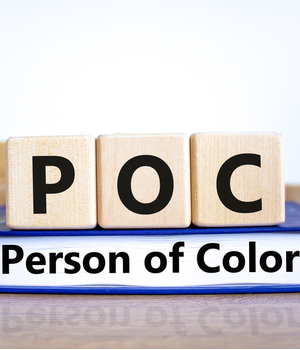Get Help With Alcohol Addiction
- Find meetings near you
- Discover online or in person meetings
- Get 24 hour information on addiction

35 QTBIPOC Alcohol Addiction Resources
QTBIPOC and Alcohol Abuse
 Alcohol use disorder (AUD), also known as alcoholism or alcohol addiction, impairs a person’s ability to control their use of alcohol. They continue to consume it, despite negative consequences. As of 2019, nearly 15 million people age 12 and older in the U.S. had AUD.
Alcohol use disorder (AUD), also known as alcoholism or alcohol addiction, impairs a person’s ability to control their use of alcohol. They continue to consume it, despite negative consequences. As of 2019, nearly 15 million people age 12 and older in the U.S. had AUD.
According to data from the National Institute on Drug Abuse (NIDA), the rate of alcohol use is even higher in the LGBTQ+ community compared to the general population. (One in four, or roughly 25%, of LGBTQ+ individuals abuse alcohol.)
Research has also revealed that BIPOC individuals face many barriers to alcohol addiction treatment that prevent them from getting the help they need. Some of these barriers include:
- Stigma and fear surrounding substance abuse treatment
- Racism, bias, and discrimination in treatment
- Cultural differences and culturally-insensitive treatment systems
- Legal or immigration status
- Socioeconomic disparities
- Language barriers (Higher proportions of BIPOC speak a language other than English, which can make it difficult to find a treatment provider.)
When these factors are combined, QTBIPOC individuals face multiple challenges regarding alcohol addiction and treatment. Because of this, the QTBIPOC population needs supportive alcoholism resources that address the unique challenges they face.
QTBIPOC Alcohol Statistics
A quick look at the statistics underscores two things: 1) You’re not alone. 2) There is a significant need for alcohol addiction and related resources for QTBIPOC individuals.
- 25% of LGBTQ+ individuals abuse alcohol — compared to 5-10% of heterosexual individuals.
- Lesbian women have 3x greater likelihood of alcohol consumption compared to heterosexual men and women.
- Bisexual women and men report higher rates of alcoholism compared to heterosexual men and women.
- Gay, lesbian, and bisexual adolescents are 90% more likely to use alcohol than heterosexual adolescents.
- Lesbian, gay, and bisexual adults are more likely to engage in binge drinking and heavy alcohol use than heterosexual adults.
- Around 45% of LGB individuals between the ages of 18 and 29 reported binge drinking.
- Black and Latino individuals are far less likely than White people to complete outpatient treatment and residential addiction treatment.
- Access to treatment services is very limited in some Native/Indigenous communities.
Is It Time to Get Help?
 Not sure if you or a loved one are in need of alcohol addiction or mental health resources? Consider the following questions. The answers will help you decide whether it’s time to get help.
Not sure if you or a loved one are in need of alcohol addiction or mental health resources? Consider the following questions. The answers will help you decide whether it’s time to get help.
- Does drinking interfere with work, school, or other activities?
- Have I experienced frequent blackouts from drinking?
- Am I unable to control the amount of alcohol I consume?
- Am I spending a lot of time drinking or recovering from drinking?
- Do I drink early in the day, drink alone, or stay drunk for long periods of time?
- Do I experience withdrawal symptoms when I don’t drink for a while? (feel shaky, sick, sweaty, anxious)
If the answers to these questions are “yes,” tap into the resources below to get the support you or your loved one needs.
Each of the 35 treatment options, interventions, and support networks below is aimed at improving the statistics and outcomes in the QTBIPOC community.
QTBIPOC Alcohol Addiction Organizations and Foundations
- BEAM: This organization offers a search tool to locate Black medical professionals, including therapists, who have experience working with LGB and Trans clients.
- GaL-AA (Gays and Lesbians in Alcoholics Anonymous): This organization serves the LGBTQ+ members of AA. Their website offers links to resources for LGBTQ+ individuals who are struggling with alcoholism and are looking for support.
- LGBT Foundation: This foundation offers support and information relating to alcohol abuse and addiction. The foundation’s goal is to provide support that allows LBGT people to increase knowledge and skills to improve their health and well-being.
- Mentalhealth.gov: This site is home to the office of Behavioral Health Equity, which coordinates efforts to reduce disparities in mental health and substance use disorders across populations.
- Pride Institute: This was the first provider in the country to offer residential addiction treatment geared solely toward LGBTQ individuals. Located in Eden Prairie, MN, the institute’s programs include residential, intensive outpatient, family therapy, and sexual health. The facility offers 17 different treatment methods, to tailor to each QTBIPOC individual’s needs.
- Zuna Institute: This advocacy organization was created to address the needs of Black lesbians. It offers seminars, conferences, and connections to other resources.
QTBIPOC Alcohol Recovery Support
- A Safe Place Online Alcoholics Anonymous Meeting: The online meeting is LBGTQ+ oriented. The group offers Zoom meetings and telephone conference call meetings. It is open to anyone struggling with alcohol abuse.
- Gay and Sober: This site offers a directory of LGBT and LGBT-friendly AA meetings. Search for meetings by area. The site also includes other recovery resources for LGBTQ+ individuals.
- Online Intergroup of AA Meetings: This arm of AA exists to assist and facilitate AA in cyberspace. The site offers a directory of online AA meetings, searchable by filters, including LGBTQ.
- QTBIPOC AA: A safe space for QTBIPOC individuals who are willing to stop drinking alcohol. Newcomers are welcome. Offers online meetings on Mondays.
- YMSM + LGBT Center of Excellence: This organization provides evidence-based, culturally responsive prevention and treatment services for minority LGBT populations dealing with substance use and mental health disorders.
QTBIPOC Alcohol Recovery Media: Podcasts, Books, Social
- Emotional Sobriety, Dry Drunks, and Being Gay in Recovery: This podcast discusses what it means to be a dry drunk, how to gain emotional sobriety, and how relationships change when you get sober.
- LGBTQ Alcoholics in AA: A collection of stories by recovering alcoholics who identify as LGBTQ+. The individuals share their experiences before and after joining AA and how the program helped them.
- Minaa B: This therapist and wellness coach promotes health and wellness among QTBIPOC individuals.
- Recovery in the LGBT Community: In this podcast, Dr. Tom Freese shares insights on recovery issues that affect the LGBT community. Dr. Freese served as the director of the YMSM+LGBT Center of Excellence.
- Served Up & Sober: This Instagram page is designed for women of color who are interested in sobriety and would like support.
- Sober Black Girls Club: This Instagram page was established by sober Black girls, for sober Black girls.
QTBIPOC Recovery Resources for Family Members and Loved Ones
- Al-Anon: This support group program is for people whose lives have been affected by someone else’s drinking. Families and friends of alcoholics come together for mutual support. Meetings are available nationwide in-person and online.
- Diversity Collective: A nonprofit organization that provides resources for the LGBTQ+ community. This site offers links to LGBTQ+ Al-Anon meetings and events.
- Preventing Substance Abuse Among LGBTQ Teens: This free downloadable provides information about substance abuse among LGBTQ+ young people and offers recommendations for parents and other adults who can help these teens avoid or limit alcohol use.
QTBIPOC Mental Health and Alcohol Addiction Resources
- AYANA Therapy: A platform that connects BIPOC and LGBTQ+ individuals to relevant therapy services. The organization is committed to ending racism and oppression and its impact on mental health.
- Center for Black Equity: This LGBTQ+ network is committed to improving health and wellness opportunities and economic empowerment. Their goal is to improve the lives of black LGBTQ+ people worldwide.
- Latinx/Hispanic Communities and Mental Health: This site, offered by Mental Health America, provides information about mental health and mental illness in the Latinx/Hispanic community and offers links to resources available in Spanish.
- Latinx Therapy: This resource offers self-help techniques and links to find therapists. It was created with the aim to break the stigma of mental health related to the Latinx community.
- LGBTQ Psychotherapists of Color: This directory matches QTBIPOC individuals with licensed therapists within their community.
- Mental Health America – Finding an Anti-Racist Therapist: A guide to finding a culturally-sensitive counselor. Includes online search tools to filter therapists by race, ethnicity, and other factors.
- One Sky Center: This center is dedicated to improving prevention and treatment of substance abuse problems among Native people.
- The Loveland Foundation: This organization offers financial assistance for Black women and girls who are seeking treatment.
- The Trevor Project: This organization offers crisis intervention and suicide prevention for QTBIPOC youth. It provides additional resources for support and tools to help people help others.
- Therapy for Queer People of Color: This directory connects QPOC with providers who offer all-inclusive treatment plans and focus on the unique needs of each client.
QTBIPOC Suicide Prevention and Mental Health Crisis Lines
- LGBT National Help Center: The help center is aimed at serving gay, lesbian, bisexual, transgender and questioning people with free and confidential peer-support and details of local resources.
- LGBT National Hotline: 888-843-4564
- LGBT National Youth Talkline: 800-246-7743
- LGBT National Senior Hotline: 888-234-7243
- SAMHSA’s National Helpline: 800-662-HELP – This helpline is all-inclusive, offering free, confidential treatment referral and information to all individuals and families facing alcohol use disorders. Available 24/7, 365 days a year.
- Trans Lifeline: This grassroots hotline provides direct emotional and financial support to trans people in crisis. It offers peer support for trans individuals given by trans individuals.
- Trevor Lifeline: 866-488-7386 This number connects callers to a crisis counselor 24/7, 365 days a year. All calls are free and confidential.
- TrikoneNW: Crisis – 866-427-4747 Recovery Help Line – 866-789-1511 Available 24/7. Offers intervention, information, and referrals to substance abuse services for youth and adults in Washington state.
REFERENCES
Alcohol facts and statistics. (n.d.). National Institute on Alcohol Abuse and Alcoholism (NIAAA). Retrieved July 3, 2022, from https://www.niaaa.nih.gov/publications/brochures-and-fact-sheets/alcohol-facts-and-statistics
Jacobson, J. O., Robinson, P. L., & Bluthenthal, R. N. (2007). Racial disparities in completion rates from publicly funded alcohol treatment: Economic resources explain more than demographics and addiction severity. Health Services Research, 42(2). https://doi.org/10.1111/j.1475-6773.2006.00612.x
National Institute on Drug Abuse. (2017a, September 5). Substance use and suds in LGBTQ* populations. National Institute on Drug Abuse. https://nida.nih.gov/research-topics/substance-use-suds-in-lgbtq-populations
National Institute on Drug Abuse. (2017b, September 5). Substance use and suds in LGBTQ* populations. National Institute on Drug Abuse. https://www.drugabuse.gov/related-topics/substance-use-suds-in-lgbt-populations
Native and indigenous communities and mental health. (n.d.). Mental Health America. Retrieved July 3, 2022, from https://www.mhanational.org/issues/native-and-indigenous-communities-and-mental-health
Sexual orientation and estimates of adult substance use and mental health: Results from the 2015 national survey on drug use and health. (n.d.). Retrieved July 13, 2022, from https://www.samhsa.gov/data/sites/default/files/NSDUH-SexualOrientation-2015/NSDUH-SexualOrientation-2015/NSDUH-SexualOrientation-2015.htm
Understanding alcohol use disorder. (n.d.). National Institute on Alcohol Abuse and Alcoholism (NIAAA). Retrieved July 3, 2022, from https://www.niaaa.nih.gov/publications/brochures-and-fact-sheets/understanding-alcohol-use-disorder#